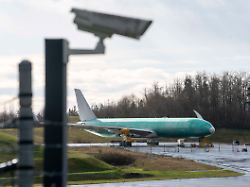Numerous deficits uncovered
US authorities find deficiencies in Boeing’s quality controls
February 27, 2024, 8:24 a.m
Listen to article
This audio version was artificially generated. More info | Send feedback
After a devastating safety incident involving an almost new Boeing aircraft in January, the aircraft manufacturer is again under pressure. The US aviation authority is now denouncing fundamental problems in the company. Apparently there is a culture in which problems are kept quiet rather than reported.
The US Federal Aviation Administration (FAA) has denounced quality assurance deficiencies at Boeing after a months-long investigation. In the commercial aircraft division, for example, an FAA commission did not find a uniform and clear way for employees to report on quality defects. “Employees did not understand how to use the different reporting systems – and which system they should use and when,” said one report. Employees also preferred to avoid formal procedures and report problems to their superiors.
After discussions with the workforce, doubts arose as to whether there would be no need to fear negative consequences for internal reports of quality problems. The commission expressed concern that Boeing workers could be discouraged from reporting problems. Overall, there is confusion among employees about their role in safety management because procedures and training are complex and constantly changing.
In the commercial aircraft division, the FAA Commission did not find a consistent and clear way for employees to report quality deficiencies. “Employees did not understand how to use the different reporting systems – and which system they should use and when,” the report said. Employees also preferred to avoid formal procedures and report problems to their superiors.
Boeing wants to improve standards
As part of the investigation, the commission also asked Boeing to demonstrate that safety was a top priority. But documents, surveys and conversations with employees have not shown that Boeing is as fundamentally committed to the goal as the company itself claims, it said. In a response, Boeing emphasized that it had supported the FAA Commission in its work and had already taken measures to improve the quality culture. The report will be evaluated and conclusions drawn for further measures.
The aircraft manufacturer is currently under increased pressure to improve quality controls following a dramatic incident. At the beginning of January, a part of the fuselage in seat row 26 broke off shortly after takeoff while climbing on a virtually new 737-9 Max with more than 170 people on board. No one was seriously injured in the incident with an Alaska Airlines plane – coincidentally, the two seats directly at the opening were empty.
After an investigation, the US accident investigation authority NTSB assumes that fastening bolts were missing from the fragment. Boeing CEO Dave Calhoun took responsibility for the error. The FAA Commission said that investigating individual incidents was not part of its duties. But the problems that came to light during their work increased their concerns. The investigation began in March 2023.
Boeing had already come under criticism five years ago after two Max planes crashed, killing 346 people. According to accident investigators, the problem lay in assistance software. Authorities around the world therefore imposed flight bans on the type: from March 2019, Max aircraft were not allowed to take off for more than a year and a half and were only permitted again after technical improvements. The debacle cost the manufacturer billions.
